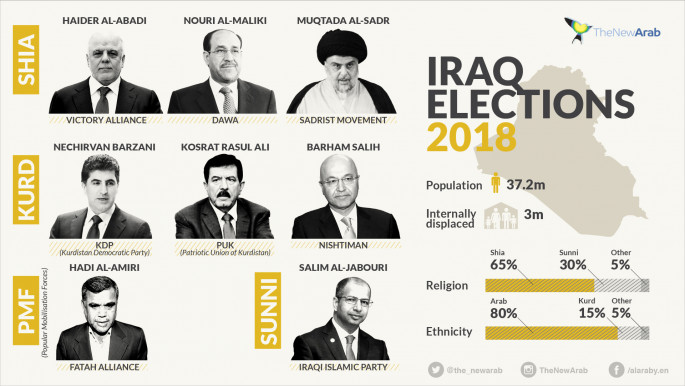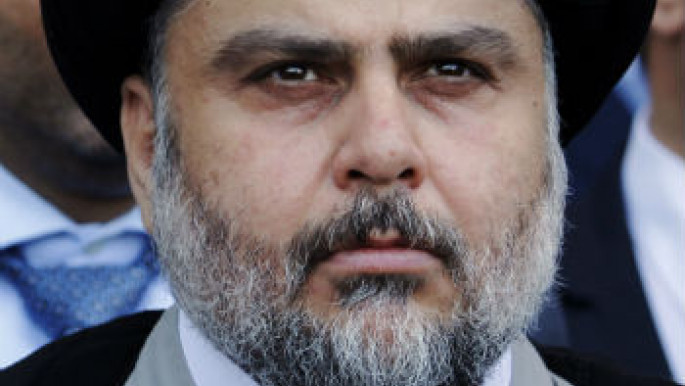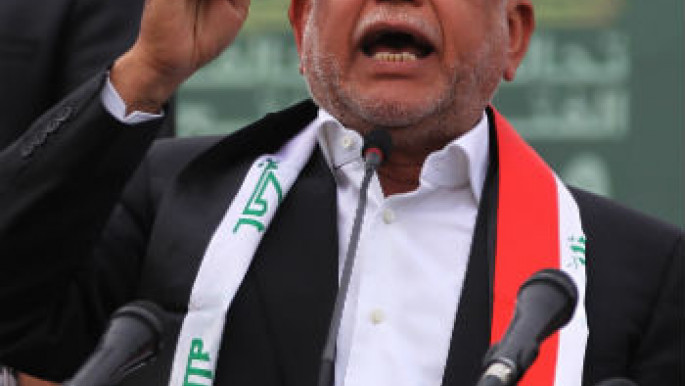Iraq elections: Meet the contenders
Iraqis head to the polls on Saturday to vote in the first parliamentary election since the country declared victory over the Islamic State group.
The turbulence of the past years of the rise and fall of IS, as well as Iraqi Kurdistan declaring, then withdrawing, independence has brought several new faces and surprising alliances into the mix.
All in all, however, much is expected to stay the same - Prime Minister Haider al-Abadi, admired by many for his near-total victory over IS, is largely expected to stay in office, despite former PM Nouri al-Maliki back in the fray.
Corruption, Iranian influence and the prevailing presence of US troops in the country are the other main issues that have dominated the run-up to the vote, in a country fraught with sectarian divides and alliances.
Around 7,000 candidates from across the spectrum of Iraq's religions and ethnicities are vying for the 329 seats in Baghdad's parliament.

Shia alliances
Shia Muslims make up approximately 65 percent of Iraq's population. The prime minister, the country's executive authority, is always Shia.
Haider al-Abadi
Victory Alliance
 |
|
| Haider al-Abadi [Getty] |
The incumbent leader, Western favourite Abadi is expected to stay in office, but faces competition from ex-PM Nouri al-Maliki and Shia paramilitary parties.
After being dramatically ousted from his former party, Dawa, Abadi founded his own list, the Victory Alliance, a reference to his overseeing of the virtual ousting of the Islamic State group from the territory they held.
Policies: Under his premiership, Abadi made corruption a key target, eliminating over-sized security details and entourages and cutting benefits to high-level officials. Abadi has also made clear his intention to be more inclusive of the country's Sunni majority. Despite this, Iraq remains a profoundly corrupt country.
Nouri al-Maliki
Dawa
 |
|
| [Getty] |
Twice former Prime Minister and a current Vice-President, Maliki is aiming to oust Abadi from office.
During his tenure as PM he was accused of nepotism and mismanaging Iraq's oil wealth, while many Iraqis suffered in poverty and poor regions remained underdeveloped.
However the coalition of his Dawa party still won the most votes in the 2014 elections.
Policies: Dawa stands for Islamic values and is somewhat subject to influence from Iran, which helps fund the party.
Muqtada al-Sadr
Sadrist movement
 |
|
| [Getty] |
The former leader of the anti-Western Mahdi Army during the US occupation, influential cleric Sadr is also expected to win big on Saturday.
Forming an unexpected alliance of his Islamist Sadrist Movement party with six mainly secular parties including the communist party, the Saairun ["Marching forwards"] alliance has widened its support base to include much of Iraq's youth and poor.
Sadr also gained popularity commanding Shia paramiltary groups in the fight against IS.
Saairun's candidates include the infamous Bush shoe-thrower, journalist Muntader al-Zaidi.
Policies: Anti-corruption and social issues rank high on Saairun's list.
Popular Mobilisation Forces - Shia paramilitaries
Despite Abadi banning militia leaders from running in elections last year in a bid to separate army and state, the vastly popular Shia militia group who were key in the battle against IS have managed to put forward numerous candidates.
Hadi al-Amiri
 |
|
| [Getty] |
"Retired" PMF general Amiri is leading the Fatah Alliance - whose name is a gesture to Shia cleric Ayatollah Ali al-Sistani, who called upon the Shia community to take up arms to conquer or, "Fatah", the Islamic State group.
A former minister of transport, Abadi became a senior commander of paramilitary fighters in recent years. Many of the candidates on his list were also paramilitary commanders before they cut their official ties with the force in order to seek office.
The PMF has been considerably helped by Iranian funding, and seats for PMF candidates will likely signal an increasing Iranian influence over Iraq's parliament.
Fatah had a brief alliance with Abadi's Victory coalition which was cut short after opposition from the PM's anti-Iranian followers.
New Kurdish alliances
Amid criticism of the short-lived spell of Kurdish independence, the two major parties of Iraqi Kurdistan are facing a new challenger.
Nechirvan Barzani
 |
|
| [Getty] |
Kurdish Democratic Party
Barzani, chief of the right-wing KDP, has been Prime Minister of the Kurdistan Regional Government of Iraqi Kurdistan since March 2012.
His leadership of the region has however come under criticism.
Kosrat Rasul Ali
 |
|
| [Getty] |
Patriotic Union of Kurdistan
Rasul Ali is a veteran peshmerga fighter and chief of the left-wing PUK.
He currently holds the office of Second Prime Minister of Kurdistan Regional Government.
Barham Salih
Nishtiman Alliance
 |
|
| [Getty] |
The new Kurdish alliance meaning "homeland" brings three of the region's opposition parties together: Change Movement (Gorran), the Kurdish Islamic Group (Komal) and the Coalition for Democracy and Justice.
Barham Salih, the former KRG prime minister and long time opponent of the current leadership, heads the new list who are expected to do well.
Sunni minorities
Salim al-Jabouri
Iraqi Islamic Party
 |
|
| [Getty] |
Jabouri, currently the speaker of parliament, is the leading voice for Iraq's Sunni minority, which has disroportionately been displaced by IS and therefore many will be unable to cast their ballots.
Follow us on Twitter: @The_NewArab







![22 Arab countries at COP29 have rejected the targeting of fossil fuels [Getty]](/sites/default/files/styles/image_330x185/public/2024-11/GettyImages-2184289638.jpg?h=199d8c1f&itok=ptHl5bec)